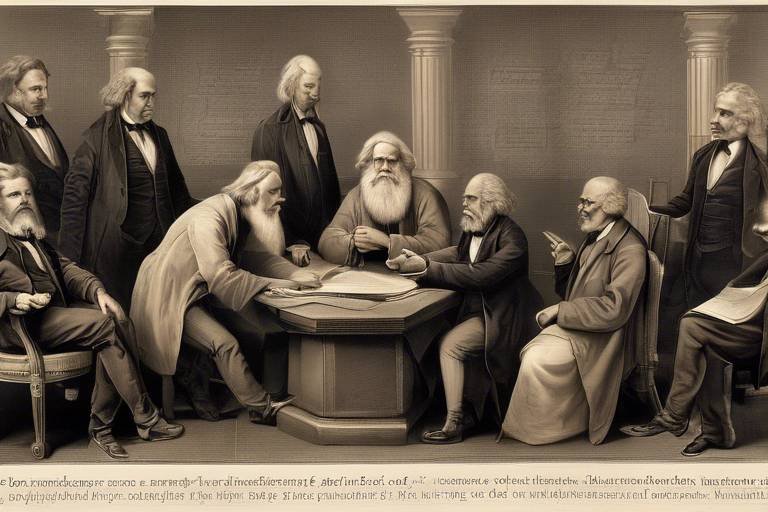Chaos Theory - Navigating through the Philosophy behind
Chaos theory is a fascinating realm that invites us to dive deep into the unpredictable nature of complex systems. Imagine standing on the shore, watching the waves crash against the rocks. Each wave is unique, shaped by countless variables—wind speed, water temperature, and even the moon's gravitational pull. Just like those waves, chaos theory reveals how tiny changes in initial conditions can lead to vastly different outcomes in various fields, from mathematics to ecology. This unpredictability challenges our traditional views of determinism in science and philosophy, making us question whether we can truly predict the future.
At its core, chaos theory is not just about randomness; it’s about understanding the underlying patterns that govern chaotic systems. It’s like peeling back the layers of an onion, revealing the intricate connections that exist beneath the surface. In a world where we often seek order and predictability, chaos theory reminds us that there is beauty in complexity and that sometimes, the most profound insights come from embracing uncertainty.
As we navigate through this article, we will uncover the historical background of chaos theory, explore its key contributors like Henri Poincaré and Edward Lorenz, and examine its applications across various domains. Additionally, we will delve into the philosophical implications of chaos theory, discussing how it challenges our understanding of determinism, free will, and the very fabric of reality. By the end of this journey, you’ll not only grasp the principles of chaos theory but also appreciate its profound impact on how we view the world around us.
Chaos theory examines how small changes in initial conditions can lead to vastly different outcomes, emphasizing the unpredictability inherent in complex systems and challenging traditional deterministic views in science and philosophy.
The development of chaos theory has roots in various scientific disciplines, including mathematics and physics. This section explores key historical milestones and figures that contributed to its emergence and evolution over time.
Prominent scientists like Henri Poincaré and Edward Lorenz played pivotal roles in shaping chaos theory. Their groundbreaking work laid the foundation for understanding deterministic chaos and its implications across various fields.
Henri Poincaré's research on celestial mechanics revealed the sensitive dependence on initial conditions, a cornerstone of chaos theory. His insights challenged conventional views and opened new avenues for understanding complex systems.
Edward Lorenz's discovery of the butterfly effect illustrated how minute changes can drastically alter outcomes. This concept has become a fundamental aspect of chaos theory, emphasizing the interconnectedness of systems.
Chaos theory has diverse applications across various fields, including meteorology, economics, biology, and engineering. Understanding these applications helps illustrate the theory's relevance in real-world scenarios and decision-making processes.
The unpredictability introduced by chaos theory raises profound philosophical questions about determinism, free will, and the nature of reality. This section delves into how chaos challenges traditional philosophical paradigms.
Chaos theory blurs the lines between determinism and indeterminism, prompting debates about whether the universe is fundamentally predictable or inherently chaotic. This discussion has significant implications for our understanding of causality.
The relationship between chaos theory and free will invites exploration of human agency within chaotic systems. Can individuals exercise free will in a world governed by unpredictable forces? This question remains a topic of philosophical inquiry.
Q: What is chaos theory?
A: Chaos theory is a branch of mathematics and science that studies how small changes in initial conditions can lead to vastly different outcomes in complex systems.
Q: How does chaos theory apply to real life?
A: Chaos theory has applications in various fields such as meteorology, economics, biology, and engineering, helping us understand and predict complex behaviors in these areas.
Q: Who are the key contributors to chaos theory?
A: Key figures include Henri Poincaré, who explored celestial mechanics, and Edward Lorenz, known for the butterfly effect concept.
Q: What are the philosophical implications of chaos theory?
A: Chaos theory raises questions about determinism and free will, challenging our understanding of predictability and human agency in a complex world.

Understanding Chaos Theory
Chaos theory is like a fascinating puzzle that reveals how the tiniest shifts in initial conditions can lead to dramatically different outcomes. Imagine you're trying to balance a pencil on its tip; just a slight breeze can send it tumbling to the ground. This idea captures the essence of chaos theory, which emphasizes the unpredictability inherent in complex systems. It challenges the traditional deterministic views that have long dominated the fields of science and philosophy, suggesting that the universe may not be as predictable as we once thought.
At its core, chaos theory studies systems that are highly sensitive to initial conditions—a phenomenon often referred to as the butterfly effect. This term originates from the idea that the flap of a butterfly's wings in Brazil could set off a tornado in Texas. While this is an exaggeration, it beautifully illustrates how interconnected and sensitive complex systems can be. In essence, chaos theory teaches us that even the smallest actions can have far-reaching consequences, making it difficult to predict outcomes in systems like weather patterns, stock markets, and ecological dynamics.
To better understand chaos theory, it's helpful to explore some of its key characteristics:
- Sensitivity to Initial Conditions: Small changes can lead to vastly different results, making long-term predictions challenging.
- Nonlinearity: Many chaotic systems are nonlinear, meaning that outputs are not directly proportional to inputs.
- Attractors: These are states towards which a system tends to evolve, regardless of the starting conditions, often leading to complex behaviors.
Chaos theory has profound implications not just in mathematics, but also in fields like meteorology, biology, economics, and even philosophy. It encourages us to rethink how we approach problems and understand the world around us. By recognizing that many systems are inherently chaotic, we can better prepare for the unexpected and navigate through the uncertainties of life.
In conclusion, chaos theory opens up a new lens through which we can view the world—one that embraces uncertainty and complexity rather than shying away from it. It's a reminder that while we may seek to impose order and predictability, the reality is often far more intricate and surprising than we can imagine.
- What is chaos theory? Chaos theory is a branch of mathematics that studies complex systems whose behavior is highly sensitive to initial conditions, leading to unpredictable outcomes.
- How does the butterfly effect relate to chaos theory? The butterfly effect illustrates how small changes in a system can lead to significant and unforeseen consequences, highlighting the unpredictable nature of chaotic systems.
- In what fields is chaos theory applied? Chaos theory finds applications in various fields, including meteorology, economics, biology, engineering, and even philosophy.
- Does chaos theory imply that the future is completely unpredictable? While chaos theory emphasizes unpredictability, it does not mean that all systems are entirely chaotic; some patterns and behaviors can still be observed.

Historical Background
The journey of chaos theory is as intriguing as the theory itself. Its roots can be traced back through the annals of various scientific disciplines, where mathematicians and physicists laid the groundwork for what we now understand as chaos theory. This exploration of chaotic behavior in systems has evolved significantly over the years, revealing a rich tapestry of ideas and discoveries that challenge our perceptions of order and predictability.
One of the pivotal moments in the history of chaos theory occurred in the late 19th century, when the French mathematician Henri Poincaré began to investigate celestial mechanics. His work not only addressed the motions of celestial bodies but also illuminated the sensitive dependence on initial conditions. This concept became a cornerstone of chaos theory, suggesting that even the tiniest variations in initial parameters could lead to vastly different outcomes. Poincaré's insights were groundbreaking, as they challenged the deterministic views that had dominated scientific thought until then.
Fast forward to the mid-20th century, and we encounter another key figure: Edward Lorenz, an American mathematician and meteorologist. Lorenz's exploration of weather patterns led him to discover what we now call the butterfly effect. This phenomenon illustrates how minute changes in initial conditions can result in dramatic differences in outcomes. For instance, the flap of a butterfly's wings in Brazil could set off a tornado in Texas. Lorenz's work not only solidified the foundations of chaos theory but also sparked interest across various fields, from meteorology to economics.
Throughout the 20th century, chaos theory continued to gain traction, with researchers from diverse disciplines contributing to its evolution. The development of computer technology allowed scientists to simulate complex systems, revealing chaotic behavior that was previously impossible to observe. This era saw the emergence of fractals, a concept closely tied to chaos theory, which visually represented the complexity and unpredictability inherent in nature.
To better understand the historical milestones in chaos theory, here’s a brief overview in table format:
| Year | Contributor | Contribution |
|---|---|---|
| 1890s | Henri Poincaré | Introduced sensitive dependence on initial conditions in celestial mechanics. |
| 1960s | Edward Lorenz | Discovered the butterfly effect, illustrating chaos in weather systems. |
| 1980s | Benoit Mandelbrot | Popularized fractals, visually representing chaotic structures in nature. |
As we delve deeper into the implications of chaos theory, it becomes evident that its historical development is not just a timeline of scientific breakthroughs but a narrative that reshapes our understanding of reality itself. The interplay between determinism and chaos continues to provoke thought and debate, inviting us to reconsider the nature of predictability in our lives.
- What is chaos theory? Chaos theory is a branch of mathematics focusing on systems that are highly sensitive to initial conditions, leading to unpredictable behavior.
- Who were the key figures in the development of chaos theory? Key figures include Henri Poincaré, who explored celestial mechanics, and Edward Lorenz, known for the butterfly effect.
- What are some applications of chaos theory? Chaos theory has applications in various fields, including meteorology, economics, biology, and engineering.
- How does chaos theory challenge traditional scientific views? It challenges the deterministic perspective by showing that small changes can lead to vastly different outcomes, suggesting inherent unpredictability in complex systems.

Key Contributors
When we think about chaos theory, a couple of names immediately spring to mind. These are the brilliant minds who dared to challenge the status quo and delve into the unpredictable nature of complex systems. Among them, Henri Poincaré and Edward Lorenz stand out as pivotal figures whose contributions have shaped our understanding of chaos. Their work not only laid the groundwork for chaos theory but also opened new doors in the realms of mathematics, physics, and beyond.
Let's start with Henri Poincaré. Often hailed as the father of chaos theory, Poincaré's insights into celestial mechanics were revolutionary. He discovered that even the smallest variations in initial conditions could lead to vastly different outcomes in the motion of celestial bodies. This phenomenon, known as sensitive dependence on initial conditions, is a cornerstone of chaos theory. Imagine trying to predict the path of a spacecraft; a tiny miscalculation in velocity or direction could send it spiraling off course into the vastness of space. Poincaré’s work fundamentally challenged the deterministic view that governed classical physics, suggesting instead that the universe could be inherently unpredictable.
Now, let’s pivot to Edward Lorenz, whose work in the 1960s brought chaos theory into the limelight with his famous butterfly effect. Lorenz was a meteorologist who stumbled upon this concept while running weather simulations. He found that a minor change in the initial conditions of his model—like rounding off a number—could lead to drastically different weather predictions. To illustrate this, he famously remarked that a butterfly flapping its wings in Brazil could set off a tornado in Texas. This idea not only captivated the scientific community but also captured the imagination of the public, emphasizing the interconnectedness of systems and the unpredictability that governs them.
Both Poincaré and Lorenz have inspired a multitude of researchers across various fields, from ecology to economics, demonstrating that chaos theory is not just a niche area of study but a profound perspective on understanding the world around us. Their legacy is a reminder that amidst the chaos, there lies a deeper order waiting to be uncovered.
- What is chaos theory? Chaos theory examines how small changes in initial conditions can lead to vastly different outcomes in complex systems.
- Who are the key contributors to chaos theory? Henri Poincaré and Edward Lorenz are two of the most influential figures in the development of chaos theory.
- What is the butterfly effect? The butterfly effect is the concept that small changes in one state of a deterministic nonlinear system can result in large differences in a later state.
- How does chaos theory apply to real life? Chaos theory has applications in various fields, including meteorology, biology, economics, and engineering, helping us understand complex systems and make predictions.

Poincaré's Contributions
Henri Poincaré, a French mathematician and physicist, is often hailed as the father of chaos theory due to his groundbreaking work in the late 19th and early 20th centuries. His research on celestial mechanics was revolutionary, revealing that even simple systems could exhibit highly complex behavior. This was a profound realization that challenged the prevailing deterministic views of the time, which posited that if one knew the initial conditions of a system, one could predict its future state with absolute certainty. Poincaré’s insights into the sensitive dependence on initial conditions illustrated that tiny variations could lead to vastly different outcomes, a principle that is now a cornerstone of chaos theory.
One of Poincaré's significant contributions was his work on the three-body problem, which examines the motion of three celestial bodies under their mutual gravitational influence. He demonstrated that while the motion of two bodies could be predicted with precision, adding a third body introduced a level of complexity that made predictions practically impossible. This realization was akin to discovering that the universe is not just a clockwork machine, but rather a living organism, constantly evolving in unpredictable ways. Poincaré's findings suggested that the universe is filled with nonlinear interactions that can lead to chaotic behavior, fundamentally altering our understanding of how systems behave.
Moreover, Poincaré introduced the concept of topology to study the qualitative properties of space that remain invariant under continuous transformations. His work laid the groundwork for the mathematical framework that supports chaos theory today. By employing geometric and topological methods, he was able to analyze complex systems in a way that was previously unimaginable. This approach not only influenced mathematics but also had profound implications in physics, biology, and even economics.
To summarize Poincaré's contributions, we can highlight three key aspects:
- Sensitive Dependence on Initial Conditions: Even tiny changes can lead to vastly different outcomes.
- The Three-Body Problem: Demonstrated the complexity introduced by additional variables in celestial mechanics.
- Topological Methods: Provided new tools for analyzing complex systems across various scientific disciplines.
In essence, Poincaré’s work was not just about solving mathematical problems; it was about reshaping the way we think about the universe itself. His legacy continues to influence not only mathematicians and physicists but also philosophers and thinkers who grapple with the implications of chaos in our understanding of reality. As we delve deeper into the intricacies of chaos theory, we owe much of our understanding to Poincaré’s pioneering spirit and intellectual curiosity.

Lorenz and the Butterfly Effect
Edward Lorenz, a meteorologist, stumbled upon a revolutionary idea while working on weather prediction models in the early 1960s. He discovered that tiny variations in initial conditions could lead to vastly different outcomes in complex systems. This phenomenon came to be known as the butterfly effect, aptly named because it suggests that the mere flap of a butterfly's wings in Brazil could set off a tornado in Texas. It's a striking metaphor that captures the essence of chaos theory: small changes can have monumental impacts.
To illustrate the butterfly effect, consider this: if you were to slightly alter the initial temperature in a weather model, the resulting forecast could diverge dramatically from what would have been predicted with the original data. This sensitivity to initial conditions is not just a quirk of meteorology; it resonates across various fields, from economics to ecology, where predicting outcomes can be surprisingly elusive.
In Lorenz’s experiments, he used a simple mathematical model to simulate atmospheric convection. However, when he rounded off a number from .506127 to .506, he noticed that this seemingly insignificant change led to a completely different weather pattern. This revelation was profound, as it highlighted the limitations of predictability in complex systems. It also raised questions about our ability to control or foresee the future, suggesting that even the smallest actions can spiral into unforeseen consequences.
As the butterfly effect gained traction, it became a popular cultural reference, symbolizing how interconnected our world is. It encourages us to reflect on the idea that our choices and actions, no matter how small, can have far-reaching effects. This notion resonates deeply in our daily lives: a decision to speak up in a meeting could lead to a major project change, just as a small act of kindness could inspire a chain reaction of goodwill.
Moreover, the butterfly effect has implications beyond just theoretical discussions; it has practical applications in various fields. For instance, in economics, understanding how minor fluctuations in market conditions can lead to significant economic shifts helps analysts make better predictions. Similarly, in ecology, recognizing how the extinction of a single species can disrupt entire ecosystems underscores the delicate balance of nature.
In summary, Lorenz's discovery of the butterfly effect has transformed our understanding of chaos theory and its implications across multiple disciplines. It serves as a reminder of the complexity and unpredictability inherent in the systems that govern our world. The next time you hear a gentle breeze or see a butterfly flutter by, remember: you might just be witnessing the beginning of something extraordinary.
- What is the butterfly effect? The butterfly effect is a concept in chaos theory that suggests small changes in initial conditions can lead to vastly different outcomes in complex systems.
- Who discovered the butterfly effect? Edward Lorenz, a meteorologist, discovered the butterfly effect while working on weather prediction models in the 1960s.
- How does the butterfly effect relate to chaos theory? The butterfly effect illustrates the sensitivity of complex systems to initial conditions, a key principle of chaos theory.
- Can the butterfly effect be observed in everyday life? Yes, the butterfly effect can be observed in many areas of life, as small actions can lead to significant and sometimes unpredictable consequences.

butterfly effect
This article explores the intricate principles of chaos theory, its philosophical implications, and how it influences various fields, from mathematics to ecology, offering insights into the unpredictable nature of complex systems.
Chaos theory examines how small changes in initial conditions can lead to vastly different outcomes, emphasizing the unpredictability inherent in complex systems and challenging traditional deterministic views in science and philosophy.
The development of chaos theory has roots in various scientific disciplines, including mathematics and physics. This section explores key historical milestones and figures that contributed to its emergence and evolution over time.
Prominent scientists like Henri Poincaré and Edward Lorenz played pivotal roles in shaping chaos theory. Their groundbreaking work laid the foundation for understanding deterministic chaos and its implications across various fields.
Henri Poincaré's research on celestial mechanics revealed the sensitive dependence on initial conditions, a cornerstone of chaos theory. His insights challenged conventional views and opened new avenues for understanding complex systems.
Edward Lorenz's discovery of the illustrated how minute changes can drastically alter outcomes. This concept has become a fundamental aspect of chaos theory, emphasizing the interconnectedness of systems. To put it simply, the butterfly effect suggests that the flap of a butterfly's wings in one part of the world could set off a tornado in another. While this may sound like an exaggeration, it serves as a powerful metaphor for how seemingly insignificant actions can lead to monumental consequences.
At its core, the butterfly effect is about sensitivity to initial conditions. In practical terms, this means that in complex systems, even the tiniest variation can lead to vastly different results. For instance, consider the weather: a small change in temperature or humidity can lead to entirely different weather patterns. This unpredictability is what makes long-term forecasting so challenging.
Here’s a simple illustration of the butterfly effect in different fields:
| Field | Example |
|---|---|
| Meteorology | A small change in atmospheric pressure can lead to a storm. |
| Economics | A minor shift in consumer behavior can trigger a market crash. |
| Ecology | The extinction of a single species can disrupt an entire ecosystem. |
| Engineering | A tiny flaw in a bridge design can lead to catastrophic failure. |
This effect not only highlights the complexity of systems but also invites us to reflect on our actions and their potential ripple effects. In a world where everything is interconnected, understanding the butterfly effect encourages a sense of responsibility. It reminds us that our choices, no matter how small, can have far-reaching impacts.
The unpredictability introduced by chaos theory raises profound philosophical questions about determinism, free will, and the nature of reality. This section delves into how chaos challenges traditional philosophical paradigms.
Chaos theory blurs the lines between determinism and indeterminism, prompting debates about whether the universe is fundamentally predictable or inherently chaotic. This discussion has significant implications for our understanding of causality.
The relationship between chaos theory and free will invites exploration of human agency within chaotic systems. Can individuals exercise free will in a world governed by unpredictable forces? This question remains a topic of philosophical inquiry.
- What is chaos theory? Chaos theory studies how small changes in initial conditions can lead to vastly different outcomes in complex systems.
- What is the butterfly effect? The butterfly effect is a concept within chaos theory that suggests small actions can lead to significant consequences.
- How does chaos theory apply to real life? Chaos theory can be observed in various fields such as meteorology, economics, and ecology, where small changes can have large impacts.
- Does chaos theory imply that everything is random? Not necessarily; chaos theory suggests that while systems can be unpredictable, they are still governed by underlying rules.

illustrated how minute changes can drastically alter outcomes. This concept has become a fundamental aspect of chaos theory, emphasizing the interconnectedness of systems.
This article explores the intricate principles of chaos theory, its philosophical implications, and how it influences various fields, from mathematics to ecology, offering insights into the unpredictable nature of complex systems.
Chaos theory examines how small changes in initial conditions can lead to vastly different outcomes, emphasizing the unpredictability inherent in complex systems and challenging traditional deterministic views in science and philosophy.
The development of chaos theory has roots in various scientific disciplines, including mathematics and physics. This section explores key historical milestones and figures that contributed to its emergence and evolution over time.
Prominent scientists like Henri Poincaré and Edward Lorenz played pivotal roles in shaping chaos theory. Their groundbreaking work laid the foundation for understanding deterministic chaos and its implications across various fields.
Henri Poincaré's research on celestial mechanics revealed the sensitive dependence on initial conditions, a cornerstone of chaos theory. His insights challenged conventional views and opened new avenues for understanding complex systems.
Edward Lorenz's discovery of the butterfly effect illustrated how minute changes can drastically alter outcomes. This concept has become a fundamental aspect of chaos theory, emphasizing the interconnectedness of systems.
Imagine a butterfly flapping its wings in Brazil, which sets off a chain reaction leading to a tornado in Texas weeks later. This vivid metaphor captures the essence of the butterfly effect, where seemingly insignificant actions can yield monumental consequences. In the realm of chaos theory, this principle illustrates that even the tiniest variations in initial conditions can lead to vastly different outcomes in complex systems. The implications of this are profound and far-reaching, affecting not only scientific understanding but also our everyday lives.
To further illustrate this concept, consider a simple example from meteorology. A weather forecast can be altered by just a slight change in temperature or humidity. The table below showcases how minor fluctuations can lead to different weather predictions:
| Initial Condition | Outcome |
|---|---|
| Temperature: 20°C, Humidity: 50% | Sunny |
| Temperature: 20.1°C, Humidity: 50% | Rain |
| Temperature: 19.9°C, Humidity: 50% | Cloudy |
This table exemplifies how minute adjustments in the initial conditions of a weather system can lead to drastically different weather outcomes. The interconnectedness of these systems is a hallmark of chaos theory, reminding us that complexity is often hidden beneath the surface of apparent order.
Chaos theory has diverse applications across various fields, including meteorology, economics, biology, and engineering. Understanding these applications helps illustrate the theory's relevance in real-world scenarios and decision-making processes.
The unpredictability introduced by chaos theory raises profound philosophical questions about determinism, free will, and the nature of reality. This section delves into how chaos challenges traditional philosophical paradigms.
Chaos theory blurs the lines between determinism and indeterminism, prompting debates about whether the universe is fundamentally predictable or inherently chaotic. This discussion has significant implications for our understanding of causality.
The relationship between chaos theory and free will invites exploration of human agency within chaotic systems. Can individuals exercise free will in a world governed by unpredictable forces? This question remains a topic of philosophical inquiry.
- What is chaos theory? Chaos theory is a branch of mathematics and science that studies how small changes in initial conditions can lead to vastly different outcomes in complex systems.
- Who are the key figures in chaos theory? Key figures include Henri Poincaré, who studied celestial mechanics, and Edward Lorenz, known for his discovery of the butterfly effect.
- What are some applications of chaos theory? Chaos theory is applied in various fields such as meteorology, economics, biology, and engineering to understand complex systems.
- How does chaos theory relate to free will? Chaos theory raises questions about human agency, suggesting that in a chaotic world, the exercise of free will may be influenced by unpredictable factors.

Applications of Chaos Theory
Chaos theory isn't just a fascinating mathematical concept; it has profound implications and applications across a variety of fields. From predicting weather patterns to understanding economic fluctuations, chaos theory offers a lens through which we can view the unpredictable nature of complex systems. This unpredictability can often feel like trying to catch smoke with your bare hands—elusive and challenging, yet incredibly important to grasp. By applying chaos theory, we can better navigate the intricacies of systems that seem random at first glance.
In meteorology, for instance, chaos theory plays a crucial role in weather forecasting. Traditional models often rely on linear assumptions, but the atmosphere behaves chaotically. A small change in initial conditions, such as temperature or humidity, can lead to vastly different weather outcomes. This is why a weather forecast for a week from now can be so uncertain. Meteorologists use chaos theory to improve their models, making them more adaptable to the inherent unpredictability of weather systems.
Another significant application of chaos theory is found in economics. Economic systems are influenced by countless variables, including consumer behavior, market trends, and government policies. The interaction of these factors can create chaotic behavior, making economic predictions notoriously difficult. By applying chaos theory, economists can analyze market fluctuations and identify patterns that might otherwise go unnoticed. For example, the stock market often exhibits chaotic characteristics, where minor events can trigger major shifts in stock prices. Understanding these dynamics can help investors make more informed decisions.
Biology also benefits from chaos theory, particularly in understanding population dynamics and ecosystems. The relationships between different species and their environments can be incredibly complex. A small change, like the introduction of a new predator or a shift in climate, can lead to drastic changes in population sizes. Chaos theory helps biologists model these interactions, providing insights into how ecosystems respond to changes and how to manage conservation efforts effectively.
Moreover, chaos theory is increasingly being applied in engineering, particularly in the design of systems that require high levels of precision and reliability. For example, in aerospace engineering, understanding chaotic dynamics is essential for designing stable flight patterns for aircraft. Engineers use chaos theory to predict potential failures in systems and to develop strategies that mitigate risks associated with chaotic behavior.
In summary, chaos theory's applications span multiple disciplines, each revealing the intricate dance of predictability and unpredictability that defines our world. Whether it's in the skies above us, the markets we invest in, or the ecosystems we strive to protect, chaos theory provides a framework for understanding complexity. As we continue to explore these applications, we uncover the profound interconnectedness of systems and the delicate balance that governs them.
- What is chaos theory? Chaos theory is a branch of mathematics that studies the behavior of dynamical systems that are highly sensitive to initial conditions, leading to outcomes that appear random or unpredictable.
- How does chaos theory apply to weather forecasting? In meteorology, chaos theory helps improve weather models by acknowledging that small changes in initial conditions can lead to vastly different weather outcomes.
- Can chaos theory be applied to social sciences? Yes, chaos theory can be applied to social sciences, particularly in understanding complex human behaviors and interactions that can lead to unpredictable societal trends.
- What role does chaos theory play in biology? Chaos theory helps biologists understand complex ecological interactions and population dynamics, providing insights into how species respond to environmental changes.

Philosophical Implications
The emergence of chaos theory has not only transformed scientific perspectives but has also stirred a whirlwind of philosophical discourse. At the heart of this discourse lies the question of determinism versus indeterminism. Traditionally, many believed that the universe operates like a well-oiled machine, where every action has a predictable reaction, a concept rooted deeply in classical physics. However, chaos theory throws a wrench into this neat machinery, suggesting that even the tiniest variations in initial conditions can lead to vastly different outcomes. This unpredictability challenges the notion that the universe is entirely predictable, igniting debates about whether the cosmos is fundamentally chaotic or if there is an underlying order that we simply fail to comprehend.
Moreover, the implications of chaos theory extend into the realm of free will. If the universe is indeed chaotic, what does that mean for our ability to make choices? Are our decisions merely the products of complex systems beyond our control? This leads us to ponder whether individuals can genuinely exercise free will, or if we are simply navigating through a labyrinth of unpredictable forces. The interplay between chaos and human agency raises profound questions: Can we be held accountable for our actions if they are influenced by chaotic systems? Are our lives predestined by the chaotic nature of the universe, or do we possess the power to carve our own paths?
To further explore these philosophical implications, we can consider a few key points:
- Understanding Causality: Chaos theory complicates our understanding of cause and effect. In a chaotic system, pinpointing the exact cause of an event becomes a daunting task, as multiple factors can intertwine in unpredictable ways.
- The Nature of Reality: The unpredictability inherent in chaotic systems challenges our perception of reality. If reality is shaped by chaos, then our understanding of it may always be incomplete.
- Human Agency: The relationship between chaos and free will invites us to reconsider the nature of choice and responsibility in a world where outcomes can be radically altered by minute changes.
In essence, chaos theory serves as a philosophical mirror, reflecting our deepest uncertainties about the nature of existence. It compels us to confront the limitations of our understanding and invites us to embrace the complexity of life. Just as a butterfly flapping its wings can lead to a tornado on the other side of the world, our thoughts and actions may ripple through the chaotic fabric of reality, creating outcomes we could never have anticipated. This realization can be both exhilarating and terrifying, reminding us that while we seek order and predictability, the universe often dances to the rhythm of chaos.
| Question | Answer |
|---|---|
| What is chaos theory? | Chaos theory studies how small changes in initial conditions can lead to vastly different outcomes in complex systems. |
| How does chaos theory relate to free will? | Chaos theory raises questions about whether our decisions are truly free or influenced by unpredictable forces in the universe. |
| Can chaos theory be applied to everyday life? | Yes, chaos theory can be seen in various real-world scenarios, such as weather patterns, stock market fluctuations, and even personal relationships. |

Determinism vs. Indeterminism
When we delve into the fascinating world of chaos theory, we stumble upon a captivating debate: determinism versus indeterminism. At its core, determinism posits that every event or state of affairs, including every human decision and action, is the outcome of preceding events in accordance with the natural laws. Imagine a perfectly orchestrated symphony where every note follows the last with precision and predictability. In this view, if we had complete knowledge of the initial conditions of a system, we could predict its future state with absolute certainty.
However, chaos theory throws a wrench into this neat and tidy narrative. It introduces the idea that even the tiniest variations in initial conditions can lead to dramatically different outcomes. Think of it like a game of dominoes: if you knock over the first one just a bit differently, the entire cascade could change direction, or even stop altogether. This sensitivity to initial conditions is what makes chaos theory so intriguing and challenges the deterministic viewpoint.
On the other hand, indeterminism suggests that not all events are determined by preceding events. It allows for randomness and unpredictability in the universe. This perspective aligns more with the chaotic nature of complex systems, where factors can interact in unforeseen ways. In this light, the universe resembles a wild river, twisting and turning unpredictably rather than flowing in a straight line. Here, the implications are profound: if the universe is fundamentally indeterministic, where does that leave our understanding of causality and responsibility?
To further illustrate this dichotomy, consider the following aspects:
| Aspect | Determinism | Indeterminism |
|---|---|---|
| Nature of Events | Predictable and predetermined | Random and unpredictable |
| Philosophical Implications | Supports a linear causation model | Challenges the notion of strict causality |
| Human Agency | Limited; actions are results of prior states | Greater; allows for free will and choice |
This ongoing debate between determinism and indeterminism is not merely academic; it has real-world implications. For instance, in fields like psychology and ethics, understanding whether our actions are preordained or subject to randomness can influence how we view accountability and moral responsibility. If our choices are merely the result of prior conditions, can we truly hold individuals accountable for their actions? Or, if there’s an element of randomness, does that mean we have the power to change our destinies?
Ultimately, chaos theory invites us to rethink our assumptions about the universe and our place within it. It encourages a more nuanced understanding that embraces the complexity and unpredictability of life. So, the next time you find yourself pondering whether everything happens for a reason, or if life is just a series of random events, remember that the answer might just lie in the beautiful chaos of existence itself.
- What is chaos theory? Chaos theory studies how small changes in initial conditions can lead to vastly different outcomes in complex systems.
- How does chaos theory relate to determinism? Chaos theory challenges the deterministic view by showing that even slight variations can lead to unpredictable results.
- Can chaos theory explain human behavior? Yes, chaos theory can provide insights into the unpredictable nature of human decisions and actions.
- What are some applications of chaos theory? It is applied in fields like meteorology, economics, biology, and engineering to understand complex systems.

Free Will and Chaos
When we dive into the swirling waters of chaos theory, we can't help but bump into the age-old question of free will. It's like trying to find a calm spot in a stormy sea—challenging yet intriguing. So, can we truly exercise our free will in a world that seems to be governed by unpredictable forces? This question isn't just a philosophical musing; it taps into the very essence of our existence and how we perceive our choices.
At first glance, chaos theory might suggest that we are mere puppets dancing to the strings of randomness. After all, if tiny changes in initial conditions can lead to vastly different outcomes, what does that mean for our decisions? Are we simply reacting to a chaotic environment, or do we have the power to steer our own ships? It's a paradox that has captivated thinkers for centuries.
To unpack this, let's consider a few key points:
- Interconnectedness of Events: In chaotic systems, everything is connected. A decision made today can ripple through time, causing effects that are unpredictable. This interconnectedness raises questions about the extent of our control.
- Illusion of Control: Sometimes, we believe we are in control, but the reality may be that we are simply navigating through a complex web of influences and outcomes. This leads us to ponder whether our choices are genuinely ours or just a product of the chaos around us.
- Agency within Chaos: Despite the unpredictability, many argue that we still possess agency. Our ability to make choices, even in chaotic environments, suggests that we can influence outcomes, albeit in ways that are not always clear or linear.
Interestingly, chaos theory also encourages us to embrace uncertainty. Instead of fearing the unknown, we can learn to adapt and respond to the ever-changing landscape of our lives. This adaptability is a form of exercising free will, as it allows us to navigate through chaos with intention and purpose.
Moreover, the relationship between free will and chaos can be likened to a dance. Imagine a couple dancing in a crowded ballroom—their movements are influenced by the rhythm of the music and the presence of others, yet they still express their unique style. Similarly, we may be influenced by chaotic forces, yet we still have the capacity to make choices that reflect our individuality.
In conclusion, while chaos theory complicates our understanding of free will, it does not eliminate it. Instead, it prompts us to reconsider what it means to be free in a world filled with uncertainty. It challenges us to recognize that our choices matter, even if the outcomes are not always predictable. Just like navigating through a storm, the journey may be chaotic, but it's also where we discover our true selves.
- What is chaos theory? Chaos theory is a branch of mathematics and science that studies complex systems whose behavior is highly sensitive to initial conditions, often leading to unpredictable outcomes.
- How does chaos theory relate to free will? Chaos theory suggests that while our decisions may be influenced by chaotic systems, we still possess agency and the ability to make choices that reflect our individuality.
- Can chaos theory be applied in everyday life? Yes! Understanding chaos theory can help us navigate uncertainty and adapt to changing circumstances in our personal and professional lives.
- Is everything in life chaotic? Not everything is chaotic, but many systems exhibit chaotic behavior, especially those that are complex and interconnected.
Frequently Asked Questions
- What is chaos theory?
Chaos theory is a branch of mathematics and science that studies complex systems whose behavior is highly sensitive to initial conditions. This means that tiny changes can lead to vastly different outcomes, making long-term predictions practically impossible.
- How does chaos theory relate to the butterfly effect?
The butterfly effect is a concept within chaos theory that illustrates how small changes in a system can have large effects elsewhere. For example, the flapping of a butterfly's wings in one part of the world might eventually lead to a tornado in another part, highlighting the interconnectedness of events.
- Who are the key contributors to chaos theory?
Notable figures in chaos theory include Henri Poincaré, who laid the groundwork through his research on celestial mechanics, and Edward Lorenz, who introduced the butterfly effect. Their pioneering work has significantly shaped our understanding of chaotic systems.
- What are some real-world applications of chaos theory?
Chaos theory has applications across various fields such as meteorology, where it helps in weather forecasting, economics for understanding market fluctuations, biology in population dynamics, and engineering for designing resilient systems. Each application showcases the relevance of chaos in everyday scenarios.
- How does chaos theory challenge traditional views of determinism?
Chaos theory blurs the lines between determinism and indeterminism by suggesting that while systems may be deterministic, their outcomes can still be unpredictable due to sensitivity to initial conditions. This raises questions about whether the universe is fundamentally predictable or inherently chaotic.
- Can chaos theory inform our understanding of free will?
The relationship between chaos theory and free will is complex. It invites us to consider whether individuals can exercise free will in a world influenced by unpredictable forces. This ongoing philosophical inquiry challenges our understanding of human agency within chaotic systems.


















